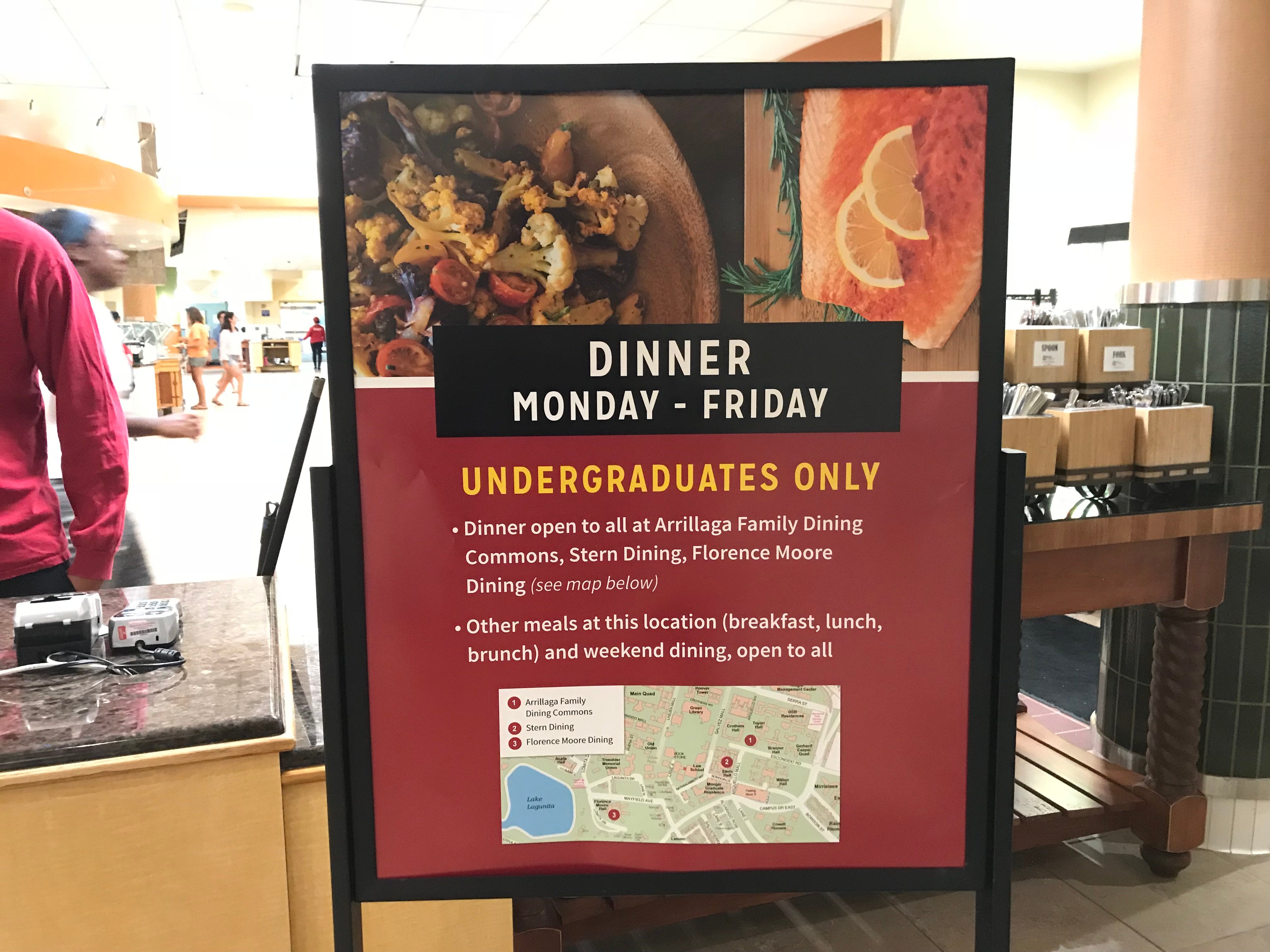After widespread criticism from graduate students on dining hall restrictions, Residential and Dining Enterprises (R&DE) announced Friday night that Ricker Dining is now open to graduate students from 7-8:30 p.m. following High Performance Education (HPE) dinner.
Starting this quarter, undergraduate-only HPE dinners, funded by the Provost, were expanded to cover all dinner hours at Wilbur, Gerhard Casper, Ricker and Lakeside Dining. While met with positive feedback from undergraduates, the changes sparked outcry from graduate students, many of whom said they found their dinner options abruptly curtailed without clear communication or consultation from R&DE.
“A lot of graduate students didn’t know this until they stepped into the dining hall about to swipe their meal plan and then realized they couldn’t get in,” said Graduate Student Council (GSC) co-chair Yiqing Ding M.S. ’18.
According to Ph.D. candidate Yi Shao, closing Ricker and Lakeside to graduate students particularly affected engineering and medical students who live on the west side of campus and, as a result, must walk longer distances to reach an appropriate dining hall.
“It would take 30 more minutes for us to get one single dinner, which can be a huge amount of time if this condition persists for a year,” Shao wrote in a message to The Daily.
R&DE spokesperson Jocelyn Breeland cited “the special role of dining halls in building community and in supporting the programming offered by resident fellows (RFs) and other residential staff” as part of the rationale for keeping HPE dinners undergraduate-only.
Ding, however, said excluding graduate students from HPE dinners is largely a question of money; he said that R&DE does not have the funds or the authority to open HPE dinners to graduate students. Therefore, solutions to meet the needs of Stanford’s graduate population must take a different route.
In a statement issued to The Daily following the original publication of this article, Breeland refuted Ding’s claim, reiterating that residential programming in dining spaces often prevents the expansion of culinary services.
“Funding certainly is a factor, but additional funding alone would not resolve this challenge,” she wrote.
Ding and GSC co-chair Amy Tarangelo met with R&DE before the start of the quarter to discuss graduate student opposition to the restrictions. That meeting resulted in a tentative plan — now abandoned — to push back the closing time of Forbes Family Cafe in the Huang Engineering Center from 5 to 7 p.m. Under the proposed compromise, graduate students would have been able to use meal swipes to eat dinner at Forbes Cafe.
However, graduate students had reservations about accepting R&DE’s solution.
“Graduate students want more options,” Ding said. “Forbes Cafe is a very small cafe. They don’t have enough space for that many people. For most people, Forbes is just not enough.”
During its Sept. 26 meeting, the GSC held a discussion with Breeland and R&DE Executive Director of Stanford Dining Eric Montell. At the meeting, GSC counselors raised concerns over the restrictions on their dining hall options and the lack of communication from R&DE. Montell encouraged graduate students to eat in Florence Moore Dining Hall and to take advantage of cooking classes in the Arrillaga Family Dining Commons (AFDC). In response to communication concerns, he said R&DE does not have access to many of the mailing lists available to the GSC.
Last Friday night, Montell announced via email that Ricker Dining would reopen to graduate students for a portion of the dinner service, in lieu of extending Forbes Cafe’s hours. His email also highlighted the other dining hall dinner options for graduate students, including Branner, Stern, Florence Moore and AFDC. Dinner hours in Stern and Florence Moore have also been extended to 8:30 p.m.
“This will meet both the resident fellow (RF)/undergraduate programmatic needs and graduate student dining preferences,” Montell wrote. “It also means that graduate students will not have to incur additional cost for the traditional dinner and can continue to use their grad meal plan.”
In addition, new features have been added to some non-HPE dining halls, including fresh berries and “action stations” where students can watch chefs prepare made-to-order entrees.
Despite the compromise, many graduate students continue to criticize R&DE’s decision. Ding said that it remains especially difficult for his constituency of Chinese graduate students, most of whom eat primarily at dining halls.
“R&DE should reverse its policy change,” Ding said. “It may be a long shot because of the money issue, but it has become a huge outcry among graduate students. When [R&DE] sent out the email Friday night [announcing Ricker’s reopening to graduate students], I immediately received emails and complaints. I did email R&DE, and we are trying to get them to come to our meeting again.”
For Ph.D. candidate Yuan Chen, the issue extends beyond just dining options.
“First, for people who have already bought meal plans, it’s very unfair to them because now they have fewer dining halls open to them, so it’s worth less than it was,” Chen said. “Second, it makes graduate students feel like they’re a separate group from undergrad students. The school’s treating us differently. I feel like a second-class citizen here.”
This article has been updated with additional comment from Jocelyn Breeland.
Correction: a previous version of this article incorrectly stated that HPE meals were funded by the Vice Provost for Undergraduate Education, not the Provost’s office. The Daily regrets the error.
Contact Erin Woo at erinkwoo ‘at’ stanford.edu.
